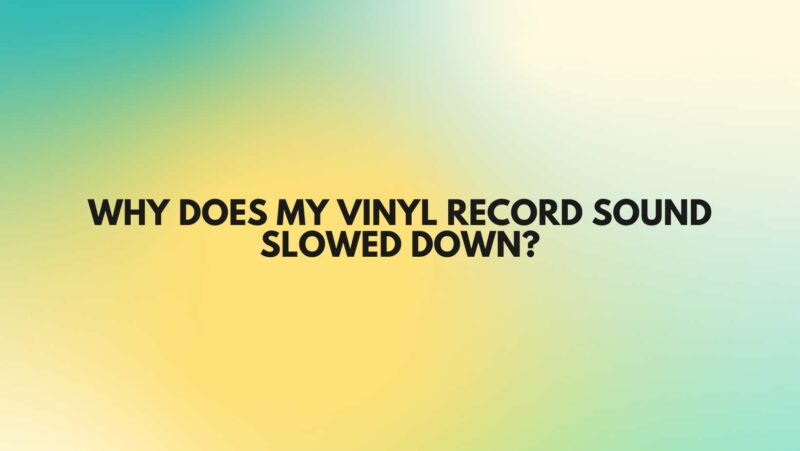The allure of vinyl records lies in their analog warmth and tactile experience. However, if your vinyl records sound slowed down during playback, it can be quite frustrating and can significantly impact your listening enjoyment. This comprehensive guide explores the common reasons behind the phenomenon of vinyl records sounding slowed down and provides practical solutions to rectify the issue.
Understanding Vinyl Playback Speed
Before diving into troubleshooting, it’s essential to grasp the fundamental concept of vinyl playback speed. Vinyl records are designed to play at specific speeds, the two most common being:
- 33 1/3 RPM (Revolutions Per Minute): This speed is standard for most LPs (long-playing records) and allows for extended playtime on each side.
- 45 RPM: This higher speed is typically used for 7-inch singles and some EPs (extended play records) with shorter tracks.
Understanding these playback speeds is crucial for diagnosing and resolving slow playback issues.
Common Reasons for Slow Playback and Solutions
Slow playback on vinyl records can result from various factors, including mechanical problems, stylus issues, or incorrect settings. Here are the common causes and their corresponding solutions:
- Belt-Drive Turntable Issues:
- Issue: Belt-drive turntables utilize an elastic belt to connect the motor to the platter, and over time, this belt may stretch, slip, or wear out, causing slow playback.
- Solution: Examine the condition of the drive belt. If it’s loose, stretched, or damaged, replace it with a new one following the manufacturer’s instructions. Verify proper belt alignment as per your turntable’s manual.
- Direct-Drive Turntable Problems:
- Issue: Direct-drive turntables are generally less susceptible to speed issues. However, motor or speed control circuitry problems can still occur.
- Solution: If you suspect motor or speed control issues, consult a professional technician for a thorough inspection and potential repairs.
- Stylus and Cartridge:
- Issue: A worn or damaged stylus can struggle to track the grooves correctly, leading to slow playback.
- Solution: Inspect the stylus for wear or damage and replace it if necessary. Ensure proper alignment between the stylus and cartridge following the manufacturer’s guidelines.
- Turntable Settings:
- Issue: Incorrect settings on the turntable can impact playback speed. Some turntables have a speed adjustment control that can be accidentally altered.
- Solution: Check for a speed adjustment knob or control on your turntable and set it to the correct speed (33 1/3 or 45 RPM) as indicated on your record.
- Record Condition:
- Issue: Warped or damaged records can cause tracking problems and result in slow playback.
- Solution: Inspect your records for warping, scratches, or debris. Play only well-maintained records to ensure accurate playback speed.
- Environmental Factors:
- Issue: Temperature and humidity fluctuations in the listening environment can affect turntable performance and cause speed irregularities.
- Solution: Maintain a stable environment for your turntable, with consistent temperature and humidity levels.
- Power Supply Issues:
- Issue: Voltage fluctuations or an inadequate power supply can affect the motor’s performance and cause slow playback.
- Solution: Ensure your turntable is connected to a stable power source and consider using a voltage stabilizer or surge protector to prevent electrical issues.
Conclusion
Encountering slow playback on vinyl records can be vexing, but it’s typically a solvable problem with careful troubleshooting and maintenance. By addressing common causes such as belt wear, stylus condition, turntable settings, and environmental factors, you can restore your vinyl listening experience to its full potential. If the issue persists despite your efforts, consider seeking professional assistance from a qualified technician to diagnose and repair any underlying mechanical or electrical problems. Remember that patience and attention to detail are key to resolving speed-related issues and preserving the enjoyment of your vinyl records.


